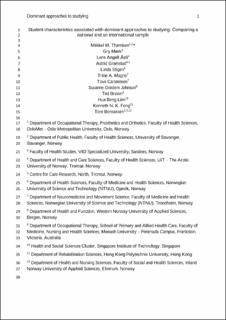Student characteristics associated with dominant approaches to studying: Comparing a national and an international sample
Thørrisen, Mikkel Magnus; Mørk, Gry; Åsli, Lene Angel; Gramstad, Astrid; Stigen, Linda; Magne, Trine A; Carstensen, Tove; Johnson, Susanne Grødem; Brown, Ted; Lim, Hua Beng; Fong, Kenneth; Bonsaksen, Tore
Peer reviewed, Journal article
Accepted version
Permanent lenke
https://hdl.handle.net/11250/2720150Utgivelsesdato
2020Metadata
Vis full innførselSamlinger
- Import fra CRIStin [3580]
- Institutt for helse og funksjon [568]
Originalversjon
Thørrisen, M. M., Mørk, G., Åsli, L. A., Gramstad, A., Stigen, L., Magne, T. A., … Bonsaksen, T. (2020). Student characteristics associated with dominant approaches to studying: Comparing a national and an international sample. Scandinavian Journal of Occupational Therapy, 2020. 10.1080/11038128.2020.1831056Sammendrag
Background Productive approaches to studying (deep and strategic learning) are associated with a variety of favourable academic outcomes, and may be of particular importance for students in multifaceted and complex disciplines such as occupational therapy. Aim To explore associations between student characteristics and their dominant approaches to studying in two samples of occupational therapy students: a national sample of Norwegian first-year students, and an international sample of students in different year cohorts (Australia, Hong Kong, Singapore and Norway). Materials and methods A total of 180 (national sample) and 665 (international sample) students were included in the study. Approaches to studying were measured with the Approaches to Study Skills Inventory for Students (ASSIST). Data were analyzed with adjusted multinomial regression analyses. Results Age, gender and prior higher education were not associated with the dominant study approach. More time spent on independent study (international sample: OR = 1.07/1.08, p < 0.01/<0.001) and having current study program as the top priority line of education at enrolment (national sample: OR = 2.89, p < 0.05) predicted productive study approaches. Conclusions and significance Factors such as age, gender and prior higher education seem to be of limited importance for understanding students’ dominant approaches to studying.
Beskrivelse
This is an Accepted Manuscript of an article published by Taylor & Francis in Scandinavian Journal of Occupational Therapy on 11 Oct 2020, available online: http://www.tandfonline.com/10.1080/11038128.2020.1831056.
Available 2021-10-11.
